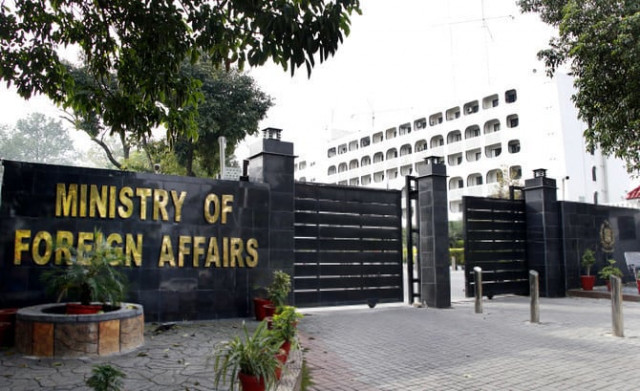Pakistan has rejected Indian claims made under the Lok Sabha debate on “Operation Sindoor”, called them baseless and provocative. The Ministry of Foreign Affairs spokesman condemned India on Wednesday to distort facts, justify aggression and use conflict for domestic political gain.
According to FO, the actions of India are a continuation of its tendency to produce accusations without credible evidence. Pakistan categorically rejected the notion of “Operation Sindoor,” as Indian leaders described as a military success that targeted alleged terror infrastructure in Pakistan.
Read: FIELD Marshal confirms obligation to eliminate terrorism, uplifting Balochistan
The spokesman reminded the world that India’s attack on Pakistan on the night of 6-7. May resulted in the martyrdom of innocent civilians, including men, women and children. “India could not achieve any of his strategic goals,” the spokesman said, adding that Pakistans counteracts the neutralization of Indian fighter jets and military targets remain an undisputed fact.
Declaration from the spokesman in response to media inquiries regarding the debate in the Indian Parliament on the Sindoor operation.
Answer to media inquiries about the debate in the Indian Parliament about the so -called “Operation Sindoor,” the spokesman said: … pic.twitter.com/ijcwmzubfn
– Ministry of Foreign Affairs – Pakistan (@ForeignOfficepk) July 30, 2025
Pakistan also criticized India’s refusal to participate in a transparent, independent probe in the Pahagam attack despite an offer from the Pakistan Prime Minister to investigate the matter. Instead of accepting the offer of an independent study, India chose to escalate tension and act one -sided. “India acted as a judge, jury and executioner at the same time,” the spokesman said.
The spokesman further rejected India’s allegations of the so -called “Operation Mahadev”, called it a fabricated tale. The declaration of India’s domestic minister was described as unreliable and raised serious doubts about its credibility. Pakistan pointed out that the alleged perpetrators of the Pahagam attack were allegedly killed just before the debate Lok Sabha began, where he questioned the timing and validity of the Indian version of events.
Read more: Rahul slams modi over Operation Sindoor Spin
Pakistan also strongly rejected India’s continued insistence on establishing a “new normal” in bilateral connections. “For us, the only ‘normal’ in bilateral connections is respect for sovereignty, territorial integrity and compliance with the principles and the purpose of the UN -Charter,” the spokesman said. Pakistan has made it clear that any future aggression will be met by force, as evidenced by its decisive actions in May 2025.
Pakistan also repeated his rejection of India’s allegations of “nuclear extortion”, which called such claims misleading. “India’s narrative is a self -service attempt to change blame on Pakistan and divert attention from his own escalating actions,” the spokesman said. Pakistan confirmed that it uses its conventional ability to deter aggression, not to escalate conflicts.
In addition to the military claims, Pakistan recorded his rejection of India’s unilateral acts regarding the Indus Waters Treaty. The spokesman condemned India’s decision to hold the Treaty in Abeyance and argued that such a movement shows an obvious ignorance of international treaties and undermines regional cooperation. “India must immediately fulfill his treaty obligations instead of celebrating illegal and unilateral acts,” the spokesman said.
The statement was concluded by warning that India’s dependence on disinformation and aggressive rhetoric risks destabilizing South Asia. However, Pakistan remains committed to peace, regional stability and meaningful dialogue aimed at solving all outstanding problems, including the core conflict in Jammu and Kashmir.
ALSO READ: Pakistan makes peace overture to India
The recent conflict between Pakistan and India marked a greater military escalation between the two nuclear power. The tension between Pakistan and India rose after the Pahagam attack on April 22 in Indian illegally occupied Jammu and Kashmir (IIOJK), which killed 26 tourists.
In response, India took on a number of hostile actions the next day of April 23, including the suspension of the 65-year-old Indus Waters Treaty (IWT), who canceled Visa for Pakistani citizens and closed the Wagah Attari border transition and ordered the shutdown of Pakistan High Commission in New Delhi. India and Pakistan subsequently reduced diplomatic staff at their respective embassies in the countries of others.
Pakistan strongly rejected the accusation and did not call it substantiated, but took mutual measures through his National Security Committee (NSC). These included stopping trade in India, ending Pakistani airspace to Indian aircraft and other recesses.
The night of May 7, the Indian Air Force launched an unprovoked attack on civilian targets in Pakistan. Pakistan Air Force (PAF) immediately reciprocated and shot down at least six IAF jet, including three French-built Rafales.
Escalation further, on the night of 9th -10. May, India launched another round of strikes against Pakistan, but this time targeted military places and airbases.
In contrast, Pakistan Operation launched Bunyanum Marsoos, which struck back on Indian military installations, including missile storage sites, airbases and other strategic goals. The early morning attacks came as a shock to the Indian military leadership who had underestimated Pakistan’s response to their unprovoked attack.
When the conflict was spiraling, US President Donald Trump announced on May 10 that a ceasefire had reached after an intense diplomatic effort overnight. The two sides gradually reduced troop numbers from the international border in the following weeks.



